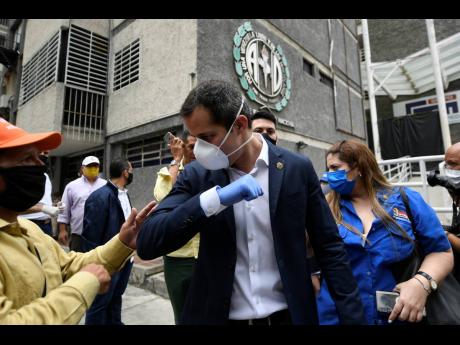Maduro’s hold tightens as coronavirus surges
CARACAS (AP):
More than a year after a young US-backed politician rose up to oust Venezuelan President Nicolás Maduro, the socialist leader holds a yet stronger grip on power — with a boost from the novel coronavirus.
The Venezuelan opposition hoped that 2020 could bring new momentum after several failed pushes to overthrow Maduro. Then came the coronavirus. Analysts say the pandemic has helped suck away the opposition’s already flagging support.
Fear of contagion has helped keep protesters off the streets, and the virus-driven end of a slight economic upturn has kept Venezuelans focused on daily survival, not politics.
Against that backdrop, Maduro has instituted sweeping measures ensuring Venezuela’s electoral system is bent in his favour. Meanwhile, opposition leader Juan Guaidó’s popularity has continued to plummet.
“In many ways the pandemic has been more of a blessing to Maduro than a curse,” said Geoff Ramsey, a Venezuela expert at the Washington Office on Latin America think tank. “Maduro is stronger now than at any point in the last 18 months.”
Venezuelan officials announced the first COVID-19 cases in mid-March, prompting Maduro to enact a nationwide lockdown that remains in effect. At least 146 have died and roughly 16,000 fallen sick, according to the government’s count – likely a vast underestimate because of limited testing.
On nightly broadcasts, Maduro and his lieutenants update citizens on the numbers, share information on shipments of humanitarian aid from allies like Russia and China and decree new measures to halt the virus.
“Maduro has had an opportunity to show his territorial control,” said Luis Vicente León, a Venezuelan political analyst.
Engineer Francisco Mato, once among thousands cheering Guaidó, said today his hopes of a political change have taken a back seat.
“You have to fight for your family, for food and make sure we don’t get sick,” said Matos, 42, wearing a face mask while shopping for groceries. “Politics seem like a far distant option.”
Guaidó, then a relatively secondary figure in the opposition, announced plans to oust Maduro in early 2019 and quickly gained support from more than 50 nations, led by the United States. But his call for military uprising that April failed, and by the end of the year street demonstrations had noticeably shrunk in size.
Guaidó’s only local outlet now is social media, which many Venezuelans struggle to access because of frequent power outages. As head of the National Assembly, he leads weekly legislative sessions through online conference calls not widely accessible to the public.
“While the dictatorship is every day more isolated, we hold up the banner of unity,” he wrote in a recent Twitter post with a mere 514 shares.
For many Venezuelans, the pandemic has heightened an already intense sense of isolation. International flights that had become increasingly sparse are now entirely cut off. Gas shortages and the lockdown make travel within Venezuela almost impossible.
Human rights advocates say the Maduro government is using the quarantine to further erode civil liberties.

